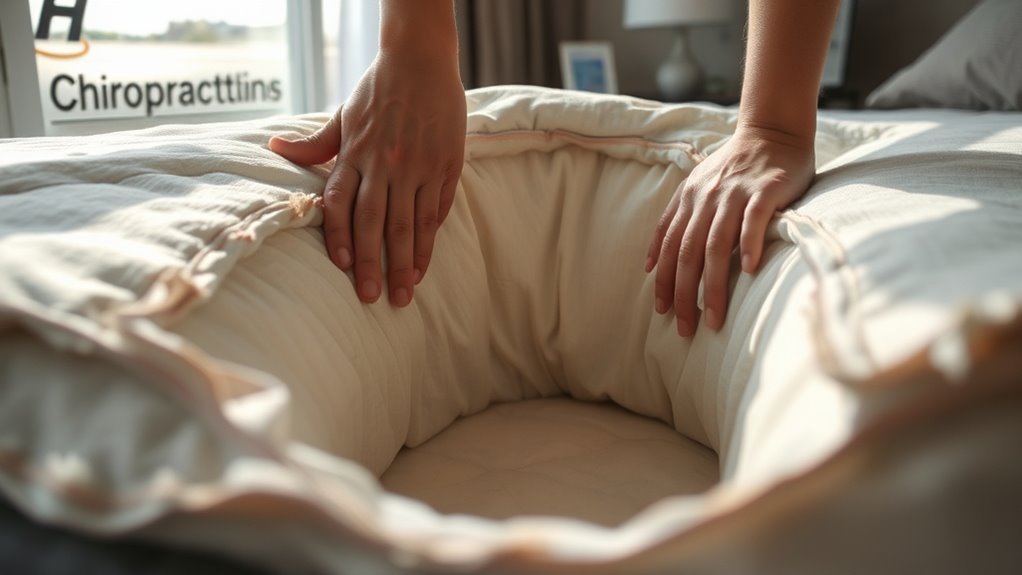If you’re waking up with nagging back pain, your mattress might be to blame. Look for signs like sagging or lumps, increased discomfort during sleep, or morning stiffness. If you’re shifting positions to find relief, it could mean your mattress isn’t providing the right support. Also, keep an eye out for visible indentations, as these can disrupt your spine alignment. Understanding these signals is key, and there’s more information ahead to help you make the right choice.
Signs of an Old or Worn-Out Mattress

When you wake up with nagging back pain, it might be more than just a bad night’s sleep; it could be a sign that your mattress is past its prime. Most mattresses have a lifespan of about 7 to 10 years, and after this period, their support levels can diminish considerably. If you notice sagging, lumps, or an increased discomfort during sleep, it’s likely time for an upgrade. A worn-out mattress fails to provide the necessary support for your spine, which can lead to chronic pain. Trust your body; if you feel unrested or experience stiffness, consider investing in a new mattress. Prioritizing your health and comfort can lead to better sleep and a more vibrant life.
Discomfort in Different Sleeping Positions

Feeling discomfort in different sleeping positions can be another indicator that your mattress isn’t providing the right support. If you notice pain when shifting from your back to your side, or even when lying on your stomach, it might be time to reassess your mattress firmness. Different sleeping postures require varying levels of support; for instance, side sleepers often benefit from a softer mattress to cushion the shoulders and hips, while back sleepers usually need something firmer for spinal alignment. If you find yourself tossing and turning to find a comfortable position, your mattress might not be accommodating your needs. Prioritizing the right support can lead to a more restful night and help you wake up feeling rejuvenated.
Increased Morning Stiffness or Pain

If you wake up each morning with increased stiffness or pain, it might be a sign that your mattress isn’t doing its job. Morning discomfort can stem from various stiffness factors, and recognizing them is crucial for your well-being. Here are three signs your mattress may be the culprit:
- Lack of Support: If your mattress doesn’t support your spine’s natural alignment, it can lead to pain.
- Old Age: Mattresses typically last about 7-10 years; if yours is older, it may be time for a change.
- Material Wear: Worn-out materials can lose their ability to cushion and support, contributing to discomfort.
Listening to your body is essential. If you’re experiencing these issues, it may be time to rethink your mattress choice.
Visible Indentations or Sagging
Visible indentations or sagging in your mattress can be a telltale sign that it’s time for a replacement. If you notice significant indentation depth or specific sagging patterns, your mattress may no longer provide adequate support. These irregularities can lead to poor spinal alignment, resulting in discomfort and back pain. Pay attention to how your body feels during sleep; if you’re waking up sore or stiff, it might be due to your mattress’s failure to support you properly. Remember, a mattress should contour to your body without sinking too deeply. Consider checking your mattress for these signs regularly, as addressing them early can restore your freedom to enjoy restful, pain-free nights. Don’t compromise on your comfort and well-being!
Allergies and Other Health Issues Related to Sleep
Have you ever considered how your mattress might be contributing to allergies or other health issues? Your sleeping environment plays an essential role in your overall well-being. If your mattress is older or not properly maintained, it could harbor dust mites, which can trigger allergies and respiratory issues. Additionally, an unsuitable mattress might exacerbate sleep apnea, disrupting your rest and leaving you fatigued.
Your mattress could be a hidden source of allergies and health issues, significantly impacting your sleep and well-being.
Here are three signs your mattress could be affecting your health:
- Frequent sneezing or nasal congestion upon waking.
- Increased asthma symptoms or breathing difficulties at night.
- Persistent fatigue or excessive daytime sleepiness.
Taking a closer look at your mattress can help you reclaim your health and freedom. Don’t underestimate its impact!
Frequently Asked Questions
How Often Should I Replace My Mattress for Optimal Back Support?
You should replace your mattress every 7 to 10 years for ideal back support. As your mattress approaches the end of its lifespan, you might notice signs like sagging, lumps, or a decrease in comfort. If you wake up with aches or stiffness, it’s a good indicator that your mattress needs replacing. Investing in a new mattress can greatly improve your sleep quality and overall well-being, giving you the freedom to enjoy restful nights.
Can a Mattress Affect My Sleep Quality Beyond Back Pain?
Absolutely, a mattress can considerably affect your sleep quality beyond just back pain. The materials used in your mattress, like memory foam or latex, can influence temperature regulation and pressure relief, impacting how well you sleep. If your mattress isn’t providing adequate support or comfort, you might find yourself tossing and turning, leading to restless nights. It’s essential to choose a mattress that promotes both comfort and support for a better night’s rest.
What Type of Mattress Is Best for Back Pain Relief?
The best mattresses for back pain relief are often memory foam and hybrid mattresses. Memory foam contours to your body, providing support and reducing pressure points, while hybrid mattresses combine coils and foam for balanced support. Both options can help align your spine and enhance comfort. It’s essential to choose a mattress that suits your sleeping position and preferences, so you can enjoy restful nights and wake up pain-free. You deserve that freedom!
How Can I Extend the Life of My Mattress?
To extend your mattress’s life, you need a balance of care and attention. First, invest time in proper cleaning; vacuum it regularly and use a mattress protector to shield against spills and dust. Rotate it every few months to guarantee even wear. You’ll find that taking these simple steps can greatly prolong its lifespan, giving you the freedom to enjoy restful nights without worrying about deterioration. Your back will thank you, too!
Are Mattress Toppers Effective in Alleviating Back Pain?
Yes, mattress toppers can be effective in alleviating back pain. By adding layers of supportive mattress materials like memory foam or latex, they provide enhanced pressure relief, helping to distribute your weight more evenly. This can reduce discomfort and improve your sleep quality. If you’re feeling tension or pain, a topper might just be the solution you need for a more restful night, allowing you the freedom to wake up feeling refreshed.



